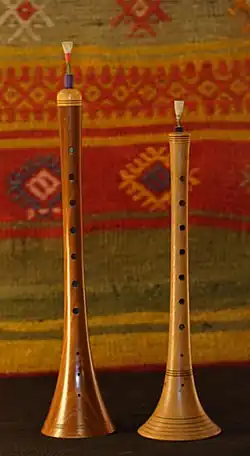سرنا
Arabic
Persian

Etymology
Borrowed from an unknown Indo-European cognate of Luwian 𒍪𒌨𒉌 (zurni, “horn”), Sanskrit शृङ्ग (ṡṛṅga, “horn”), Latin cornū, English horn, probably ultimately from Proto-Indo-European *ḱerh₂- (though Kloekhorst disagrees). Folk etymology explains the word as سور (sur, “banquet, feast”) + نای (nây, “pipe, flute, nay”).
Pronunciation
- (Classical Persian) IPA(key): /suɾˈnɑː/
- (Dari Persian) IPA(key): /sʊɾˈnɑː/
- (Iranian Persian) IPA(key): /soɾˈnɒː/
- (Tajik) IPA(key): /suɾˈnɔ/
Descendants
- → Ottoman Turkish: زورنا (zurnâ)
- Turkish: zurna
- → Bulgarian: зурна́ (zurná)
- → Classical Syriac: ܙܘܪܢܐ (zurnā)
- → English: zurna
- → Georgian: ზურნა (zurna)
- → Greek: ζουρνάς (zournás)
- → Macedonian: зурла (zurla)
- → Middle Armenian: զուռնայ (zuṙnay), զոռնա (zoṙna)
- Armenian: զուռնա (zuṙna)
- → Russian: зурна́ (zurná)
- → Serbo-Croatian: zȗrna / зу̑рна
- → Kazakh: сырнай (syrnai)
- → Chinese:
References
- Greppin, John A. C. (1991), “The Survival of Ancient Anatolian and Mesopotamian Vocabulary Until the Present”, in Journal of Near Eastern Studies, volume 50, issue 3, pages 203–207
This article is issued from Wiktionary. The text is licensed under Creative Commons - Attribution - Sharealike. Additional terms may apply for the media files.